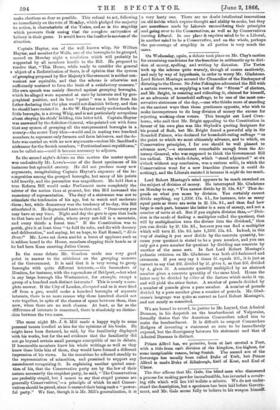In the second night's debate on this motion the master
speech was undoubtedly Mr. Lowe's—one of the finest specimens of his insincere but splendid oratory. He did not produce many new arguments, recapitulating Captain Hayter's exposure of the in- congruities among the grouped boroughs, but many of his points told heavily, and the peroration was magnificent. He held that a true Reform Bill would make Parliament more completely the mirror of the nation than at present, but this Bill increased the monotony of representation. The duty of a statesman was not to stimulate the tendencies of his age, but to watch and moderate Ahem ; but, while democracy was the tendency of to-day, this Bill stimulated it. He deprecated haste to that end. "Democracy you may have at any time. Night and day the gate is open that leads to that bare and level plain, where every ant-hill is a mountain, and every thistle a forest tree." If the Constitution was to perish, give it at least time "to fold its robe, and die with decency and deliberation," and saying, let us hope, to Earl Russell, "Et ta Brute!" Mr. Lowe sat down amidst a burst of applause such as is seldom heard in the House, members clapping their hands as if he had been Kean enacting Julius Caesar.






























 Previous page
Previous page